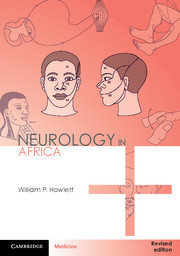Book contents
- Frontmatter
- Dedication
- Contents
- PREFACE
- Acknowledgments
- Part II Neurological Disorders
- 3 Public Health
- 4 Epilepsy
- 5 Stroke
- 6 Neurological Infections
- 7 Protozoal Andhelminthic Infections
- 8 Neurological Illness in HIV Disease
- 9 Coma and Transient Loss of Consciousness
- 10 Paraplegia Non Traumatic
- 11 Disorders of Peripheral Nerves
- 12 Cranial Nerve Disorders
- 13 Myopathies and Myasthenia Gravis
- 14 Movement Disorders and Motor Neurone Disease
- 15 Headache and Facial Pain
- 16 Intracranial Tumours
- 17 Dementia
- 18 Inherited Neurological Disorders
- 19 Head and Spinal Injury
- 20 Care in Neurology
- INDEX
- ABBREVIATIONS
- USEFUL WEBSITES
8 - Neurological Illness in HIV Disease
from Part II - Neurological Disorders
- Frontmatter
- Dedication
- Contents
- PREFACE
- Acknowledgments
- Part II Neurological Disorders
- 3 Public Health
- 4 Epilepsy
- 5 Stroke
- 6 Neurological Infections
- 7 Protozoal Andhelminthic Infections
- 8 Neurological Illness in HIV Disease
- 9 Coma and Transient Loss of Consciousness
- 10 Paraplegia Non Traumatic
- 11 Disorders of Peripheral Nerves
- 12 Cranial Nerve Disorders
- 13 Myopathies and Myasthenia Gravis
- 14 Movement Disorders and Motor Neurone Disease
- 15 Headache and Facial Pain
- 16 Intracranial Tumours
- 17 Dementia
- 18 Inherited Neurological Disorders
- 19 Head and Spinal Injury
- 20 Care in Neurology
- INDEX
- ABBREVIATIONS
- USEFUL WEBSITES
Summary
Neurological disorders are a frequent manifestation of HIV infection in Africa. At least a fifth of infected persons will present with a major neurological illness either as the first clinical manifestation of HIV or occurring during the course of symptomatic HIV disease. The proportion of patients with clinical evidence of neurological dysfunction and have abnormal neurological findings is however much higher at 40-70%. At post mortem examination, over 90% of AIDS cases have pathological changes in their nervous system. Neurological disorders affect all parts of the nervous system including the brain, spinal cord, peripheral nerves, muscle and eye. This chapter outlines the main neurological illnesses arising from HIV infection. After reading the chapter the student should aim to understand the main mechanisms, clinical presentations, diagnosis and management of these illnesses.
INTRODUCTION
Neurological disorders in HIV infection are caused by three main processes: loss of cellmediated immunity, direct HIV infection, and inflammation/autoimmunity. Adverse effects of drugs used to treat HIV and its co infections are also a cause.
Disorders related to loss in immunity are caused by opportunistic processes (OP), mostly infections and occasionally neoplasms. These occur mostly but not exclusively when the CD4 count is <200 cells/cm3. The main opportunistic infections (OI) are cryptococcosis, toxoplasmosis and tuberculosis (Chapters 6 & 7) and main opportunistic neoplasm is cerebral lymphoma. The main neurological presentations occurring as a result of those processes are meningitis, focal neurological disorder (FND) and altered level of consciousness or coma depending on the cause and CNS site involved.
Neurological disorders also arise from direct HIV infection of the nervous system and muscle. These include HIV-associated dementia (HAD), distal sensory neuropathy (DSN), vacuolar myelopathy, retinopathy and myopathy. These also occur mostly during the later stages of HIV infection when CD4 count is <100 cells/cm3.
Other neurological disorders that may occur throughout the course of HIV infection include herpes zoster, Bell's palsy, Guillain-Barre Syndrome (GBS) and polymyositis. These by contrast occur mostly during the asymptomatic stage when immunity is still relatively intact with CD4 counts typically >200 cells/cm3. GBS and polymyositis are caused by inflammation and autoimmunity. The general characteristics of the main HIV related neurological illnesses are summarized below in Table 8.1.
- Type
- Chapter
- Information
- Neurology in AfricaClinical Skills and Neurological Disorders, pp. 189 - 210Publisher: Cambridge University PressPrint publication year: 2015



